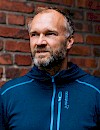AASP Newsletter - September 2019
Mental Health Support in High-Performance Sport: An Internationally-Relevant Goal and Collaborative Effort
 |
 |
 |
 |
|
|
|
|
|
Poppy DesClouds, MHK, MPC (CSPA)
Krista Van Slingerland, MA
University of Ottawa & Canadian Centre for Mental Health and Sport
Göran Kenttä, PhD
The Swedish School of Sport and Health Sciences & The Swedish Sport Confederation (Stockholm, Sweden)
University of Ottawa, Canada
What do the following athletes have in common?
Gabby Daleman, Michael Phelps, Ian Bone, Jonny Wilkinson, Robin Lehner, Kevin Love, Emily Overholt, Jenny Rissveds, Marc Savard, Terry Bradshaw, Kajsa Kling, François Imbeau-Dulac, Travis Gerrits, Kendra Fisher, Shea Emry, Silken Laumann, Gianluigi Buffon, Danny Rose, Patrik Berglund, Johan Franzén, Linus Thörnblad.
They are athletes from across the globe whose courage in telling their story of struggle with mental illness has thrust mental health to the forefront of the sport community’s consciousness. We are at a point in time where we can no longer dismiss mental health challenges in sport. Athletes want and deserve adequate resources and support to navigate the complex demands, ongoing pressures, and high expectations they face as they try to achieve their goals. It was long assumed that high-performance athletes were infallible individuals who didn’t experience mental health issues. They were seen as stoic, mentally tough warriors, unaffected by emotions and adversity. We know with certainty that this is a false representation of high-performance athletics (Reardon et al., 2019; Van Slingerland et al., 2019), and the sport community can no longer disregard what an athlete truly is: a human being.
Athletes, like everyone else, have varying levels of mental health and they are susceptible to the same mental health issues and illnesses experienced by the general population (Reardon & Factor, 2010). As an example, statistics show that every year, 1 in 5 Canadians will experience a mental health issue (Smetanin et al., 2011). This means that in any given year, there could be as many as 4 athletes on a team of 20 who are struggling to perform their day-to-day tasks in their various life contexts, including sport. Importantly, this is not a concern isolated to Canada or any specific sport. This is an internationally recognized concern (Moesch, Kenttä, Kleinert, Quignon-Fleuret, Cecil, & Bertollo, 2018; Reardon et al., 2019; Schinke, Stambulova, Si, & Moore, 2018), and as such, better support for mental health in sport is an internationally-relevant goal. Athletes worldwide experience varying levels of mental health and mental illness throughout their careers; thus coaches, support staff, administrators, and policymakers are encouraged to anticipate this reality and be ready to support their athletes.
Interestingly, there are studies showing that competitive athletes may be more susceptible to mental health challenges than the general population (e.g., Sundgot-Borgen & Torstveit, 2014). Given the unique requirements and demands of competitive sport and the constant adaptations that athletes must make to respond to stressors in their environment, they face vulnerabilities and risks that do not apply to the non-athlete population (Schinke et al., 2018). Various sport-specific factors can exacerbate existing mental health issues or trigger the development of new ones. Some of these factors include: grueling year-round training and competition programs, protocols with insufficient recovery leading to overtraining or burnout, unhealthy dietary regimes, dysfunctional sport cultures, excessive traveling, demands of early specialization, injuries, inadequate funding, abusive coaching, as well as transitions in and out of sport (Blanchard, Amiot, Perreault, Vallerand, & Provencher, 2009; Kenttä, Hassmén, & Raglin, 2006; Meeusen et al., 2013; Park, Lavallee, & Tod, 2013; Putukian, 2016; Taylor, Ogilvie, & Lavallee, 2006).
Despite this identified risk, athletes unfortunately tend not to seek help for mental health challenges (Rice et al., 2016). Within gifted or talented populations, such as that characterized by elite sport, perceptions that practitioners lack understanding of specialized characteristics and environmental demands is a significant deterrent to help-seeking (Levy & Plucker, 2003). Lopez and Levy (2013) confirmed this when they reported that student-athletes identified a familiarity with or participation in sport as their number one preferred quality in a counselor. Given the overall lack of sport-centered mental health care, two groups of researchers/practitioners have collaborated to develop and implement specialized services in Sweden and Canada.
Progressive Pathways for Mental Health Support in Sport
There are now two leading examples of national mental health support in sport and they are offered in Sweden and Canada. Although the initiatives are carried out in two different countries and continents, they share a common goal of providing more efficient, effective, specialized support for the mental health of athletes and coaches.
The first national clinic for mental health and elite sports has been up and running since early 2015 in Stockholm, Sweden, and a sister clinic in Malmö opened in May 2016. The initiative was primarily a response to the unmet clinical treatment demands (i.e., a growing number of mental health concerns) within the elite sport context in Sweden. The main purpose of the two clinics is to identify needs, assess, treat, and better understand mental health concerns in elite sports. Both clinics in Sweden operate the same way, that is, they are psychiatric clinics that have been formed through a collaboration between the public health care system and the Swedish Sport Confederation. The clinics provide ambulatory psychological and psychiatric support for elite athletes and coaches. To access the clinics and services, athletes and coaches must be 18 years or older and they must be a current or a recently retired member of a Swedish national team.
The conceptualization, development, and continued growth of the Swedish national clinics for mental health and elite sport have, in many ways, informed the development of the newest national mental health centre, The Canadian Centre for Mental Health and Sport (CCMHS). Although the Canadian Centre and the Swedish clinics have similar outcome goals (e.g., treatment of mental illness, peak athletic performance, retention of athletes and coaches in high-performance sport), the CCMHS has put in place mental health support that suits the Canadian context and the needs of Canadian athletes, coaches, and sport practitioners (e.g., offers telehealth services to accommodate the wide geographical area and complex training and competition schedules).
The CCMHS, which officially opened its doors in November 2018, is a not-for-profit organization supporting the mental health and performance of competitive and high-performance athletes and coaches. It is the first Centre in Canada to offer collaborative sport-focused mental health care services designed to help athletes and coaches achieve their performance goals while preserving their mental health and well-being. As a national hub, the CCMHS also offers information for members of the broader sport community seeking assistance with mental health.
The key feature of the CCMHS, which distinguishes its services from traditional mental health care, is its sport-centered multidisciplinary mental health care team and services. Working from three foundational pillars of Integrated Care, Research, and Community Engagement, the CCMHS relies on evidence-based principles and a comprehensive team of specialists (i.e., psychologists, psychiatrists, counsellors, psychotherapists, mental performance consultants, sport medicine and family doctors) to foster mental health and treat mental illnesses affecting the performance of competitive athletes and coaches. CCMHS practitioners understand the intricacies of the competitive sport environment and work collaboratively to provide mental health support services Canada-wide to eligible coaches and athletes both in-person and via telehealth. At the moment, athletes and coaches must be 16 years of age and older and compete at a provincial level and higher in a nationally-regulated sport to access services. However, the CCMHS plans to expand its eligibility criteria in the near future.
The directors and practitioners of both the Canadian Centre and the Swedish National Clinics collaborate often to learn from one another’s goals, approach, research, and growing pains, demonstrating the importance of community and collaboration in tackling such an all-encompassing, internationally-relevant concern.
The Role of the MPC/CMPC®
The work conducted to carry out these national initiatives has underscored that Mental Performance Consultants (MPC or CMPC®, depending on your place of work) are an ideal position to respond to athletes who are struggling with their mental health. MPCs/CMPCs may be the trusted individuals to whom athletes disclose their challenges. In other cases, they may be the key persons noting significant shifts in athletes’ behaviors and appearance that are lasting beyond one or two weeks. This should evidently prompt MPCs/CMPCs to further investigate by privately asking athletes direct questions regarding these observable shifts. Important indicators or symptoms of struggles with mental health / mental illness (Centre for Addiction and Mental Health, 2019; Canadian Mental Health Association, 2019) include but are not limited to:
- Eating or sleeping too much or too little
- Isolating or distancing oneself from others or normal activities
- Having little or no energy
- Feeling empty, down or not enjoying anything
- Having inexplicable pain
- Feeling agitated or slowed down
- Feeling useless, powerless, hopeless, or excessively guilty
- Having lost interest in work, hobbies, people, or sex
- Smoking, drinking or using drugs more than usual
- Feeling more confused, irritable, angry, worried, or scared than usual
- Having trouble concentrating, remembering, or making decisions
- Screaming at or fighting with family and friends
- Having intense mood swings that cause conflict in relationships
- Having persistent intrusive thoughts or memories
- Having a loss of touch with reality, hearing voices (hallucinations) or having strange ideas (delusions)
- Thinking of suicide or of harming oneself/others
- Unable to perform usual daily tasks
Athletes showing distress and impairment in their daily functioning as a result of these symptoms require attention. MPCs/CMPCs working with such athletes must always act within their scope (i.e., professional boundaries) of practice. More specifically, if MPCs/CMPCs are not a licensed psychologist, counselor, or psychotherapist, they must refer such athletes for further assessment (Van Slingerland et al., 2019). Consequently, it is important that they know the pathways of referral available to them.
Mental health and mental illness are critical topics in sport that deserve continued attention from AASP and other national and international organizations (Henriksen, Schinke, Moesch, McCann, Parham, Hvid Larsen, & Terry, 2019). It is imperative that psychologists, psychotherapists, counselors, and mental performance consultants recognize the difference between mental health, mental illness, and mental performance so that they are well-positioned to support one another in a collaborative and community-driven way when providing assistance to athletes and coaches (Van Slingerland et al., 2019). Given the low rates of help-seeking observed in athletic populations (Rice et al., 2016), all types of sport psychology practitioners, but particularly MPCs/CMPCs who typically work in the trenches with athletes and coaches, are important gate-keepers and facilitators who should recognize the signs of mental health struggles and make referrals to appropriate resources when necessary. Together, members of the sport psychology community across all continents must continue to grow and strengthen the network of mental health support in sport, and to serve as global leaders pioneering initiatives in the fields of mental performance and mental health.
This article has been revised from a version printed in the CSPA Newsletter, June 2019.
References
Blanchard, C. M., Amiot, C. E., Perreault, S., Vallerand, R. J., & Provencher, P. (2009). Cohesiveness, coach’s interpersonal style and psychological needs: Their effects on self- determination and athletes’ subjective well-being. Psychology of Sport & Exercise, 10, 545-551.
Canadian Mental Health Association. Understanding mental illness. Accessed May 2019 https://cmha.ca/mental-health/understanding-mental-illness.
Centre for Addiction and Mental Health. Mental illness and addiction index. Accessed May 2019 https://www.camh.ca/en/health-info/mental-illness-and-addiction-index.
Henriksen, K., Schinke, R., Moesch, K., McCann, S., Parham, W. D., Hvid Larsen, C., & Terry, P. (2019): Consensus statement on improving the mental health of high-performance athletes. International Journal of Sport and Exercise Psychology, DOI: 10.1080/1612197X.2019.1570473
Kenttä, G., Hassmén, P., & Raglin, J. S. (2006). Mood state monitoring of training and recovery in elite kayakers. European Journal of Sport Science, 6(4), 245-253.
Levy, J. J., & Plucker, J. A. (2003). Assessing the psychological presentation of gifted and talented clients: A multicultural perspective. Counseling Psychology Quarterly, 16, 229-247.
Lopez, R., & Levy, J. (2013). Student athletes’ perceived barriers to and preferences for seeking
counseling. Journal of College Counseling, 16(1), 19-31.
Meeusen, R., Duclos, M., Foster, C., Fry, A., Gleeson, M., Nieman, D., Raglin, J., Urhausan, A. (2013). Prevention, diagnosis, and treatment of the overtraining syndrome: Joint consensus statement of the European College of Sport Science and the American College of Sports Medicine. Medicine & Science in Sports & Exercise, 45(1); 186-205. doi: 10.1249/MSS.0b013e318279a10a
Moesch, K., Kenttä, G., Kleinert, J., Quignon-Fleuret, C., Cecil, S., & Bertollo, M. (2018). FEPSAC position statement: Mental health disorders in elite athletes and models of service provision. Psychology of Sport and Exercise, 38, 61-71. https://doi.org/10.1016/j.psychsport.2018.05.013
Park, S., Lavallee, D., & Tod, D. (2012). Athletes’ career transition out of sport: A systematic review. International Review of Sport and Exercise Psychology, 6(1), 22-53.
Putukian, M. (2016). The psychological response to injury in student-athletes: A narrative review with a focus on mental health. British Journal of Sports Medicine, 50(3), 145-148.
Reardon, C., Hainline, B., Miller Aron, C., Baron, D., Baum, A. L., Bindra, A., . . . Engebretsen, L. (2019). Mental health in elite athletes: International Olympic Committee consensus statement (2019). British Journal of Sports Medicine, 53, 667-699. doi:10.1136/bjsports-2019-100715
Reardon, C., & Factor, R. (2010). Sport psychiatry: A systematic review of diagnosis and medical treatment of mental illness in athletes. Sports Medicine, 40(11), 961-980. doi:10.2165/11536580-000000000-00000
Rice, S. M., Purcell, R., De Silva, S., Mawren, D., McGorry, P., & Parker, A. G. (2016). The mental health of elite athletes: A narrative systematic review. Sports Medicine, 46, 1333-1353. doi:10.1007/s40279-016-0492-2
Schinke, R., Stambulova, N. B., Si, G., & Moore, Z. (2017). International Society of Sport Psychology position stand: Athletes’ mental health, performance, and development. International Journal of Sport and Exercise Psychology, 16(6). http://dx.doi.org/10.1080/1612197X.2017.1295557
Smetanin P., Stiff, D., Briante C., Adair, C. E., Ahmad, S., & Khan, M. (2011). The life and economic impact of major mental illnesses in Canada: 2011 to 2041. RiskAnalytica, on behalf of the Mental Health Commission of Canada.
Sundgot-Borgen J., & Torstveit, M. K. (2004). Prevalence of eating disorders in elite athletes is higher than in the general population. Clinical Journal of Sport Medicine, 14, 25-32.
Taylor, J., Ogilvie, B. C., & Lavallee, D. (2006). Career transition among athletes: Is there life after sports? In J. M. Williams (Ed.), Applied Sport Psychology (pp. 595-615). New York, NY: McGraw Hill.
Van Slingerland, K. J., Durand-Bush, N., Bradley, L., Goldfield, G., Archambault, R., Smith, D., Edwards, Kenttä, G. (2019). Canadian Centre for Mental Health and Sport (CCMHS) position statement: Principles of mental health in competitive and high-performance sport. Clinical Journal of Sport Medicine, 29, 173-180.



